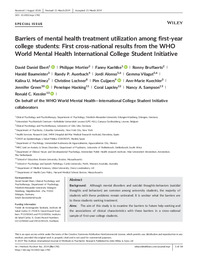Por favor, use este identificador para citar o enlazar este ítem:
https://hdl.handle.net/11000/36185Registro completo de metadatos
| Campo DC | Valor | Lengua/Idioma |
|---|---|---|
| dc.contributor.author | Ebert, David Daniel | - |
| dc.contributor.author | Mortier, Philippe | - |
| dc.contributor.author | Kaehlke, Fanny | - |
| dc.contributor.author | Bruffaerts, Ronny | - |
| dc.contributor.author | Baumeister, Harald | - |
| dc.contributor.author | et al. | - |
| dc.contributor.other | Departamentos de la UMH::Psicología de la Salud | es_ES |
| dc.date.accessioned | 2025-03-27T10:54:08Z | - |
| dc.date.available | 2025-03-27T10:54:08Z | - |
| dc.date.created | 2019-05-09 | - |
| dc.identifier.citation | International journal of methods in psychiatric research 28.2 (2019) | es_ES |
| dc.identifier.issn | 1557-0657 | - |
| dc.identifier.issn | 1049-8931 | - |
| dc.identifier.uri | https://hdl.handle.net/11000/36185 | - |
| dc.description.abstract | Background Although mental disorders and suicidal thoughts-behaviors (suicidal thoughts and behaviors) are common among university students, the majority of students with these problems remain untreated. It is unclear what the barriers are to these students seeking treatment. Aims The aim of this study is to examine the barriers to future help-seeking and the associations of clinical characteristics with these barriers in a cross-national sample of first-year college students. Method As part of the World Mental Health International College Student (WMH-ICS) initiative, web-based self-report surveys were obtained from 13,984 first-year students in eight countries across the world. Clinical characteristics examined included screens for common mental disorders and reports about suicidal thoughts and behaviors. Multivariate regression models adjusted for socio-demographic, college-, and treatment-related variables were used to examine correlates of help-seeking intention and barriers to seeking treatment. Results Only 24.6% of students reported that they would definitely seek treatment if they had a future emotional problem. The most commonly reported reasons not to seek treatment among students who failed to report that they would definitely seek help were the preference to handle the problem alone (56.4%) and wanting to talk with friends or relatives instead (48.0%). Preference to handle the problem alone and feeling too embarrassed were also associated with significantly reduced odds of having at least some intention to seek help among students who failed to report that they would definitely seek help. Having 12-month major depression, alcohol use disorder, and suicidal thoughts and behaviors were also associated with significantly reduced reported odds of the latter outcome. Conclusions The majority of first-year college students in the WMH-ICS surveys report that they would be hesitant to seek help in case of future emotional problems. Attitudinal barriers and not structural barriers were found to be the most important reported reasons for this hesitation. Experimental research is needed to determine whether intention to seek help and, more importantly, actual help-seeking behavior could be increased with the extent to which intervention strategies need to be tailored to particular student characteristics. Given that the preference to handle problems alone and stigma and appear to be critical, there could be value in determining if internet-based psychological treatments, which can be accessed privately and are often build as self-help approaches, would be more acceptable than other types of treatments to student who report hesitation about seeking treatment. | es_ES |
| dc.format | application/pdf | es_ES |
| dc.format.extent | 14 | es_ES |
| dc.language.iso | eng | es_ES |
| dc.publisher | Wiley | es_ES |
| dc.rights | info:eu-repo/semantics/openAccess | es_ES |
| dc.rights | Attribution-NonCommercial-NoDerivatives 4.0 Internacional | * |
| dc.rights.uri | http://creativecommons.org/licenses/by-nc-nd/4.0/ | * |
| dc.subject | epidemiology | es_ES |
| dc.subject | public mental health | es_ES |
| dc.subject | service utilization | es_ES |
| dc.subject | Student | es_ES |
| dc.subject | treatment gap | es_ES |
| dc.subject.other | CDU::1 - Filosofía y psicología::159.9 - Psicología | es_ES |
| dc.title | Barriers of mental health treatment utilization among first-year college students: First cross-national results from the WHO World Mental Health International College Student Initiative | es_ES |
| dc.type | info:eu-repo/semantics/article | es_ES |
| dc.relation.publisherversion | https://doi.org/10.1002/mpr.1782 | es_ES |

Ver/Abrir:
2019_106_Investigacion_Publicaciones_Barriers in mental health.pdf
819,49 kB
Adobe PDF
Compartir:
 La licencia se describe como: Atribución-NonComercial-NoDerivada 4.0 Internacional.
La licencia se describe como: Atribución-NonComercial-NoDerivada 4.0 Internacional.
.png)